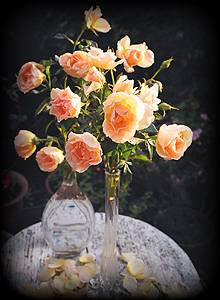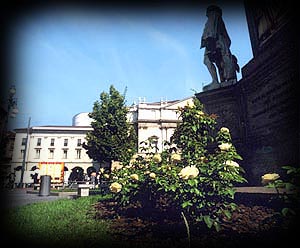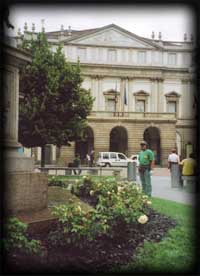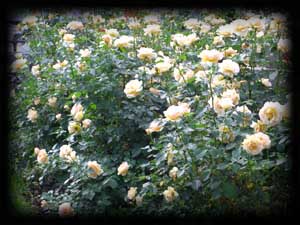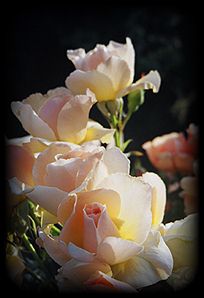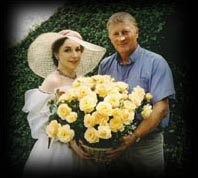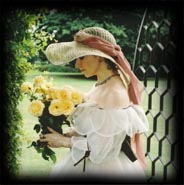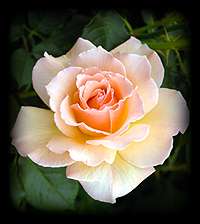 ))
))  |
||||||||||
| Click
here for the story of Susan's rose in her own words. Click here to see the rose and read the plaque in front of La Scala. |
||||||||||
During two days of judging at The Hague, Susan Daniel met all of the top International rose breeders including Robert Harkness. As the roses worked their magic, he asked "I am sure that you can make room in your life for a rose, Susan?"
Her Majesty Queen Elizabeth the Second has accepted "with great delight", 60 of these roses for a new bed at Buckingham Palace. Susan has planted one for the Archbishop of Canterbury at Lambeth Palace, and there is one at Canterbury Cathedral, as there will also be in front of La Scala, Milan. Susan is the only opera singer since Callas to have a rose named after her. She is also keen to see her rose in the memorial garden to be built in New York devoted to the English who died on September 11. The sales of Susan's rose will go to help Help for Heroes, the organisation providing support for soldiers wounded in current conflicts. London and Milan, April 2004. The Susan Daniel Rose was launched on May 24th 2004 at the Chelsea Flower Show with great success! Please click on the BBC link below to discover more about Susan's rose:
The City of Milan , at the Mayor's request, planted 100 of Rosa Susan Daniel around the feet of the statue of Leonardo da Vinci in front of Teatro alla Scala in a ceremony on 27th November 2006 - Susan's birthday. This is the first time that any singer has been honoured in this way. The rose benefits the charity Help for Heroes. The rose is already with: Her Majesty The Queen at Buckingham Palace His Grace The Archbishop of Canterbury at Canterbury Cathedral and at Lambeth Palace His Holiness the Pope in the Vatican Gardens and at Castelgandolfo HRH Prince Charles at Highgrove HRH the Princess Royal at Gatcombe Park The City of Rome in the Roseto Benenden School,Kent (Benenden asked for a background story; click here to read it.) Hurlingham School, Putney Little Angel Puppet Theatre, Islington Islington Council, Barnsbury Square La Scala, Milan |
||||||||||
The Rose is accompanied by a new CD "La Vie en Rose", available from the Galleria / Shop page on this site. Click below to listen to a sample track from the CD - The Seeds of Love. MP3 WMA RM |
||||||||||
|
||||||||||
| When Robert Harkness asked me if I would choose a new rose which was to bear my name, I felt as if something was about to happen, of which I had always dreamed . I was silenced . I felt immensely humbled and deeply grateful that such a glorious creation could be entering my life. As I watched this rose unfold, it was her translucence which struck me most, for she opened out with a radiance that I had never seen before, in a miraculously luminous combination of ivory, transparent bronze and gold. I grew up in a great medieval garden full of roses, and I loved them dearly, intrigued by their beauty, the perfumes, and by their extraordinary presence. I was given my second name, Rosalind, after my Grandmother and my Mother, and early on in my life a rose as my cypher, and later as my signet ring, yet in my work as a singer, I have always had to live in the center of cities, with little access to the Nature with which I spent my childhood, and which had meant so much to me. Last year I was invited to judge the International Rose Competition
in Rome, where I had been singing at the Opera, and suddenly a new
and fascinating world opened up to me, one of great beauty and of
wonderful inhabitants. I went on to other competitions, eventually
to Den Haag, where among my co-judges was Robert Harkness, who with
the greatest patience, answered many of my questions as I tried
to learn.
The passionate and radiantly ecstatic Rachmaninov is a great love from the days when I wanted to spend more time playing his works as a pianist, than I did studying the physics and pure and applied maths for which I was destined. French songs I had studied in Paris with Pierre Bernac, the companion of Francis Poulenc who composed the haunting, and the haunted, La Reine de Coeur. The ravishing Chausson, "Lilac Time", began its life in this version for voice and piano, although it really belongs to the orchestral repertoire and begs for that weight of singing, as does the Granados, whose magical Nightingale was written just after Stravinsky’s Firebird, yet still belongs to the era of "La Belle Epoque", and is very different from the delicacy of Chausson’s Hummingbird. I have loved the Berlioz, "Le Spectre de la Rose" since singing it at the Bayerische Staatsoper, Munich, as part of his great song cycle, and dancing with the ballet both before and afterwards. The American Charles Ives, I discovered in New York while watching Maria Callas giving her Master Classes - an experience burnt into my memory…. the delicious Italian ‘40’s ‘Swing’ number ;….. a string of Waltzes!… from the quick Viennese ones in the operettas, to Tosti’s sultry Neapolitan Serenade and his Barcarolle; E.A. Mario’s poignant, 1918...post-war description of the bombed rose beds, and finally, Ivor Novello’s stylish, "Careless Rapture", from 1936 ……all are reflections of my work in the Opera Houses of Vienna, Munich, Paris and Berlin, Milan, Naples and Rome, where I have always sung happily, along with the rhythms and echoes of all of the dancing that has been a vital part of my life, since I was three years old. They are intended as a celebration of this extraordinarily beautiful new rose, and of my own joy that such a wonderful creature could have become part of my life. I dearly hope, that she will bring as much happiness into the lives of everyone who experiences her, as she is already bringing to mine.
Milan, March 2004.
|
||||||||||
